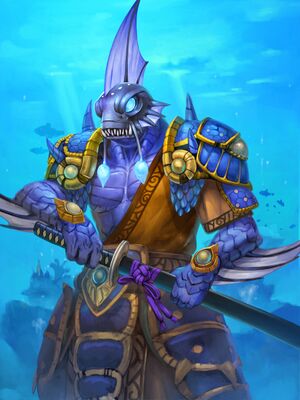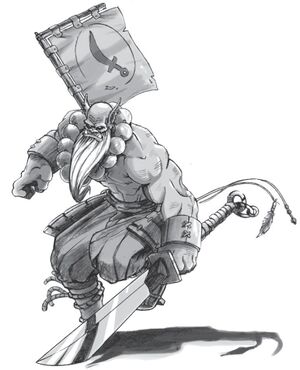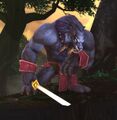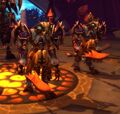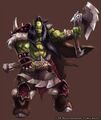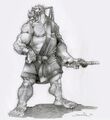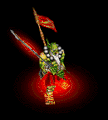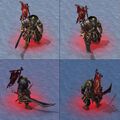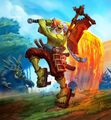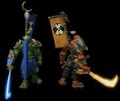Blademaster
| Blademasters | |
|---|---|
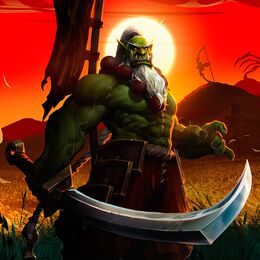 | |
| Affiliation |
Horde, Fel Horde, Mag'har Clans, Army of the Light, Lightbound, Mantid Empire, Necrolord Covenant Formerly: Iron Horde, True Horde, Old Horde, Burning Legion |
| Favored by |
|
| Weapon proficiency | Large, sharp melee weapons |
| Weapon types | Swords, axes, polearms |
| Special notes | Easily recognizable by the banners carried on their backs |
“To take up the weapon of a Blademaster is to invite your own demise.”
Blademasters, also spelled as blade masters,[1] are known for their mastery over swords, axes, and polearms.
In the orc society, blademasters are known as legendary warriors of the Burning Blade clan. They fought in the First and Second Wars as part of the Old Horde, but eventually consumed themselves in demonic corruption. The proud blademasters later swore to free themselves and their brethren from demonic control and joined the New Horde in the service of Warchief Thrall.
Background
![]() Please add any available information to this section.
Please add any available information to this section.
Among the draenei's most elite warriors who followed the naaru Xe'ra to wage war on the Burning Legion, Telaamon was a blademaster infused with the Holy Light and became a Lightforged draenei in the Army of the Light.
On Draenor, the blademasters are known to have existed long before the corruption of the orcs at the hand of the Burning Legion when the Burning Blade clan was still dwelling in Hallvalor in Nagrand and using elemental fire magic. Judging by the Ancient Blademaster, the way of the blademaster was already an ancient one years before the forming of the Old Horde. The blademaster Lantresor of the Blade was notably amongst the old Horde forces that invaded Azeroth, where he would serve under both Warchief Blackhand and Orgrim Doomhammer during the First and Second Wars, before returning to home.[2]
Third War
- Main article: Blademaster (Warcraft III)
Though their numbers are few, the seasoned blademasters represent an elite fighting force within the Horde. These skilled swordsmen were once part of the ill-fated Burning Blade clan which consumed itself in the throes of demonic corruption. With their clan scattered and broken, the proud blademasters swore a grim oath to free themselves and their brethren from demonic control once and for all. Under Thrall's command, the blademasters once again joined the Horde and came to serve as the young Warchief's personal honor guard. Though blademasters are masters of stealth and guile, they value personal honor above all else.[3]
The Blackrock Scouts and Blackrock Warriors, sub-groups of the Blackrock clan loyal to the Burning Legion, were also led by blademasters.
Outland
Fel blademasters were numerous in the forces of Magtheridon and were the chieftains of each of his bloodthirsty sub-legions. Each of the four great fel orc fortifications on the Hellfire Peninsula, guarding the dark portals, was led by a blademaster. In the Black Temple under the control of Magtheridon, several blademasters led legions of fel orcs in defense. Illidan, Kael'thas, Lady Vashj, and Akama had great battles against the fel orc blademasters both in and outside of the temple.[4][5]
Cataclysm
By the time of the Cataclysm, at least some blademasters remained loyal to the Horde. Blademaster Ronakada in Orgrimmar informed adventurers that while the blademasters' oath of freeing their people from demonic control had been fulfilled, his own honor remains unsatisfied. Thus, he would continue to fight for the Horde and train other warriors to do so until his death.[6]
Mists of Pandaria
During the campaign in Pandaria, Warchief Garrosh Hellscream employed several blademasters, with the Mag'har orc Ishi serving as his champion. Several blademasters were also stationed at Domination Point in Krasarang. Garrosh also recruited so-called Blind Blademasters into his True Horde during the Siege of Orgrimmar.
Warlords of Draenor
On the alternate Draenor where the orc clans rallied into the Iron Horde as a result of Garrosh's actions, the Burning Blade clan, led by a blademaster known as Azuka Bladefury, willingly joined. Following Gul'dan's takeover of the Iron Horde, a blademaster called Jubei'thos became a member of his Hellfire High Council.
Dragonflight
During the first Azerothian Kosh'harg festival, Lantresor of the Blade assumed leadership of the Burning Blade clan by virtue of being the eldest surviving blademaster.[7]
Abilities
- Bladestorm
- By focusing their warrior energies, blademasters can become living cyclones of fighting rage. Spinning their great blades faster than the naked eye can see, they are capable of simultaneously damaging any enemy troops in their vicinity.[3]
- Critical Strike
- By channeling their potent powers in one focused strike, blademasters can cause even greater damage to their enemies.[3]
- Mirror Image
- One of the blademasters' more mystical abilities is to create duplicate phantom images of themselves. Though the phantom images can move about freely of their own volition, they are not true entities unto themselves.[3]
- Wind Walk
- So adept and agile are the blademasters that they can move so quickly that they appear to be invisible to the naked eye.[3]
Burning Blade customs
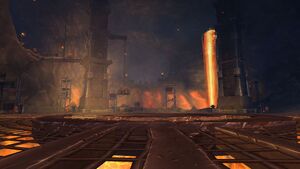
“A blademaster without a blade is no blademaster at all.”
The blade is not the only important item a blademaster carries. Once they had passed their final tests in the Masters' Caverns, the blademaster was given the honor of wearing the Burning Blade's banner.[9] The banners carried by blademasters are described as cumbersome, and it's hard to believe that they don't affect the blademasters' ability to fight.[10] In Warlords of Draenor, blademasters are shown to be capable of manipulating fire, with many of them using abilities such as "Blazing Coil".
Sticky, smelly, and highly flammable, blazegrease is liberally applied to the swords and axes of the Burning Blade clan before battle. Though some warriors choose to ignite their weapons before battle, most let the inevitable contact of blades and armor spark the blazegrease for unpredictable intimidation.[11]
Notable
- Main article: Blademasters
Named
Warcraft III
- Main article: Blademaster (Warcraft III)
Unnamed
Items and objects
 [Blademaster Leggings]
[Blademaster Leggings] [Blademaster's Honor]
[Blademaster's Honor] [Mirror of the Blademaster]
[Mirror of the Blademaster] [Shadowy Blademaster's Greatsword]
[Shadowy Blademaster's Greatsword] [The Blademaster's Necklace]
[The Blademaster's Necklace] [Triumphant Blademaster's Greatsword]
[Triumphant Blademaster's Greatsword] [Burning Blade]
[Burning Blade] [Blademaster's Banner]
[Blademaster's Banner]- Blademaster Sword
In the RPG
Among the Horde, orcs with the gladiator class are known as blademasters.[12][13]
Blademasters lead their people into melee combat, unhesitatingly seeking the most vulnerable enemy champions — magi, druids and the like. Blademasters willingly go toe-to-toe with other melee experts as well, drawing from ages of tradition to fuel their combat prowess. Their sashimono banners allow their troops to identify them on the battlefield and move to where the action is thickest. Many act as bodyguards for other Horde champions.[13] Banner of the Black Wolf is in the same style as those worn by orcish blademasters.[14]
Chieftain of the Warsong clan and an orc legend, Grom Hellscream is a blademaster of the old traditions.[15] Thrall is also a blademaster.[16]

 Gorn - Warlord of Kargath.
Gorn - Warlord of Kargath.
 Akinos Steelclaw - Diplomat to the Alliance.
Akinos Steelclaw - Diplomat to the Alliance.
 Moogul the Sly - Sage in the Horde.
Moogul the Sly - Sage in the Horde.
Notes and trivia
- Eliminating blademaster's mirror images weakens the blademaster.[17]
- Maki Waterblade is a saurok samurai, wearing items similar as a blademaster.
- Players can don the banner and weaponry of masters of the blade by using
 [Burning Blade].
[Burning Blade]. - In Warcraft III, Grommash Hellscream is classified as a blademaster, but isn't one lorewise.[18]
- Before blademasters were even a concept, Samwise Didier drew a katana-wielding orc character in Dungeons & Dragons which would later inspire Samuro.[19]
- The orc Na'Shra was originally intended to be a blademaster.
- Blademasters draw clear inspiration from Japanese and Asian culture, particularly the samurai. Many blademasters have very Japanese-sounding names, some wield katana-like swords, many wear oversized mala beads around their necks (similar to the larger version of the prayer beads worn by Shaolin monks), and their distinctive banners are seemingly inspired by sashimono, small banners carried on the backs of soldiers in feudal Japan (the banners are even outright called "sashimono" in the non-canon RPG). Japanese influence can also be seen in the fact that blademasters, and the Burning Blade clan in general, are said to value honor above all else.
Speculation
This article or section includes speculation, observations or opinions possibly supported by lore or by Blizzard officials. It should not be taken as representing official lore.
|
- From their positions in Magtheridon's army, it seems that fel orcs are led by blademasters. As the fel orcs live only for carnage and slaughter, it is plausible that they would follow those who are most capable of carrying it out.
- Captain Galvangar and Takata Steelblade may be blademasters.
- Given that blademasters wear neck-beads similar to some shaman and monks, and some possess elemental (Blazing Coil, Molten Weapon) or supernatural (Wind Walk, Mirror Image) abilities, it is possible that they also utilize their spirit to empower themselves or draw from the elemental spirits either by command or request.
Gallery
Mag'har orc blademaster.
Jubei'thos, a fel orc blademaster.
Lightforged draenei blademaster.
Krell the Serene, a saberon blademaster.
Mantid blademasters.
Maldraxxi blademaster.
Blademaster Hyku Steeledge in The Comic.
Rahjak, a fel orc blademaster in Pearl of Pandaria.
Duel at Thunder Ridge between a blademaster and a mountain king.
Blademaster art in The Art of World of Warcraft.
BlizzCon 2007 art.
Early art of the character that would serve as the basis for Samuro.
Blademaster (Warcraft III) unit model.
Warcraft III: Reforged concept art (on the left).
Samuro in Mercenaries.
Heroes of the Storm art for Samuro.
Samuro, the Blademaster from Heroes of the Storm.
Icon for Samuro's Mirror Image ability in Heroes of the Storm.
- Fan art
References
- ^ Art of World of Warcraft, pg. 9
- ^
 [15-30] Diplomatic Measures
[15-30] Diplomatic Measures
- ^ a b c d e Warcraft III: Reign of Chaos manual, pg. 84
- ^ Gates of the Abyss (WC3 BloodElf)
- ^ Lord of Outland (WC3 BloodElf)
- ^ Blademaster Ronakada#Quotes
- ^


 [50-70] The Kosh'harg
[50-70] The Kosh'harg
- ^
 [35-40] The Blade Itself
[35-40] The Blade Itself
- ^
 [35-40] Not Without My Honor
[35-40] Not Without My Honor
- ^
 [Blademaster's Banner]
[Blademaster's Banner]
- ^
 [Flask of Blazegrease]
[Flask of Blazegrease]
- ^ World of Warcraft: The Roleplaying Game, pg. 104
- ^ a b Horde Player's Guide, pg. 194
- ^ Magic & Mayhem, pg. 138
- ^ Shadows & Light, pg. 40
- ^ Shadows & Light, pg. 53
- ^
 [60] Breaking Mirrors
[60] Breaking Mirrors
- ^ Micky Neilson on Twitter: "I wouldn't consider him one."
- ^ Building the Nexus: Samuro (2016-10-20). Retrieved on 2016-10-20.
es:Maestro de las Espadas

